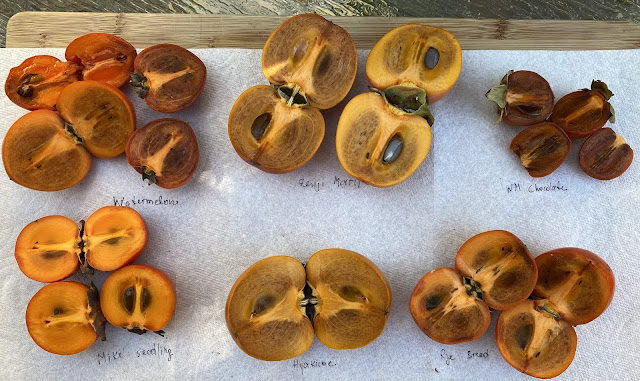Five out of the six fruits described here are PVNA (Pollination Variant Non Astringent) type, meaning they need to be pollinated and have seeds to be non-astringent at the hard stage. The non-pollinated fruits of this type are astringent until completely soft.
Mike's seedling is always astringent regardless of pollination. It should be completely soft before consumption.
Zenji Maru (top middle) - very sweet and crunchy, sweet apple flavored.
Wind Machine Chocolate (top right) - These are usually larger in size. These fruits were exceptionally small, but very sweet and date flavored. The origin of this accession is a seedling tree at the Otow orchard.
Mike's seedling (bottom left) - This is a seedling of Gosho fruit started by a friend. The fully soft fruits are very sweet. The fruits tasted today still had a little astringency as they were not completely soft.
Hyakume (bottom middle) - This was a crunchy pollinated fruit. Slightly sweet and complex in flavor with nectarine notes.
Rye Bread (bottom right) - Pollinated crunchy sweet fruits with chocolate-peach flavor. I found this tree a few years ago in Coloma and started propagating it. The fruits are from my graft.
Check our sales site if we have the cuttings available reallygoodplants.com








Thank you
ReplyDeleteHow can you tell your Hyakumes are pollinated? I believe it is really hard, so multi-generational Japanese persimonn farmers use some kind of Vodka based technique to ripen them, so that they don't have to depend on whether they are pollinated.
ReplyDeleteRunip
Yes, I know. It is hard. Vodka treatment solves the astringency problem for unpollinated fruits.
DeleteThese sound really interesting!
ReplyDelete